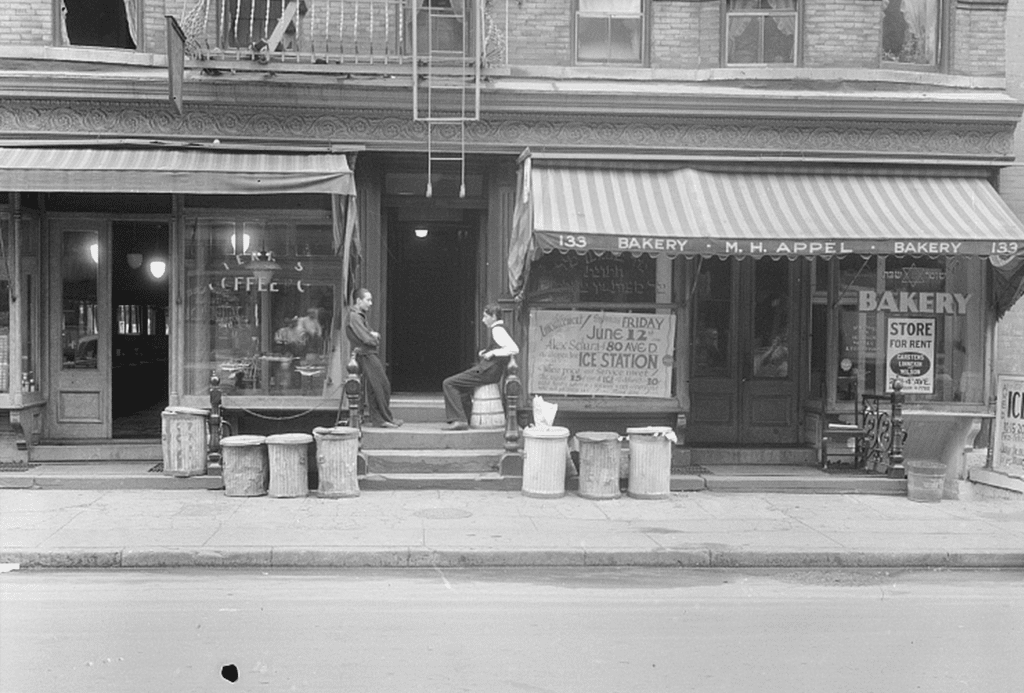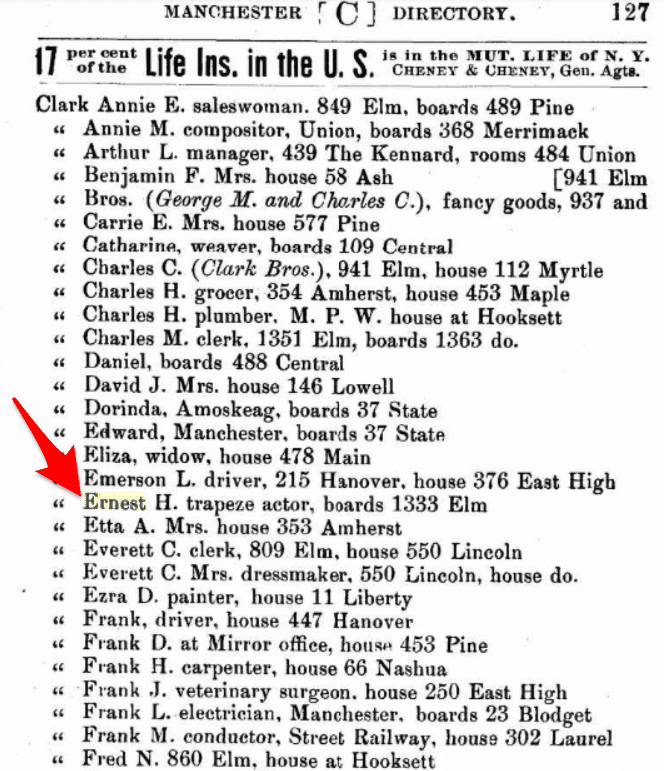Recently, I discovered proof of a fascinating family story in an unexpected place. I had looked for this proof on death and marriage records, in the federal and state census, in newspapers, and just about everywhere else I could think of that might contain the specific piece of information I needed.
Just when I thought I had exhausted all reasonable possibilities it turned up suddenly in a location I had only stumbled on by accident. A city directory.
Why Use City Directories in Your Genealogy Research
Even though I have yet been unable to locate this ancestor in the 1900 census, I was able to find him in a 1900 city directory for the town he lived in. He was only 18 when the directory was recorded but his listed occupation finally proved an old family tale I had begun to think was nothing more than fiction.
I’ll admit, I’ve known about city directories (as well as town and county directories) for a long time. I have even used them once or twice in my family history research. But I had never made them a regular part of my routine.
I see now that I had been overlooking a very important source of genealogical information. The more I learn about these valuable records, the more I am convinced that they should be one of the first places we turn to for clues about our ancestors’ lives.
Not only can a city directory be a wonderful way to verify your ancestor’s location at a certain date, but they can add crucial personal details to your records, especially for those years when a census or vital record event didn’t take place (which, of course, is most years.)
If you can locate your ancestor in a directory you may find their exact address (which is very useful for census research and many other purposes), their spouse’s name and their occupation or business. You may also discover whether they have recently moved (and to where), or passed away, since these details were sometimes recorded as well.
Because some locations created directories yearly, this can provide a wealth of new information about your ancestors in a convenient timeline.
Unfortunately, there is no guarantee your ancestor can be found in a city directory. Not all cities, towns or counties had directories, and some published them for only a few years. Many, sadly, have been lost to history. Still, it is well worth your time to see if you can discover your ancestors in this underused resource. You’ll find several free places to get started below.
Tips for Searching a City Directory
Like a phone book, names are generally listed in alphabetical order (first name and then middle initial if available). The surname is often only found once, at the top of each page. Given this, exacting searches for “First Name Last Name” may not produce the results you’re looking for.
Instead, search for the last name only and then browse until you find the first name you are in search of — or search for a first and last name without quotes. It is important to note that women were often not listed since many directories only focused on posting the head of the family. If listed, they will often appear with their husband.
The best way to search a directory is to locate the one for the location your ancestor lived and then browse it to find the surname and given name. This reduces the chance of missing your target person due to transcription errors or search mistakes.
The information from many directories was compiled the year before they were published (ie a 1900 directory may represent your ancestor’s life in 1899) so keep this in mind. You can sometimes find information about when the information was collected and published in the opening pages.
Always take the time to scroll up and down the page and review others with the same surname. You will very often discover parents, siblings and other relatives here. Also consider searching the directory for those listed at the same address (use the keyword box for this unless a address box is provided in the search form). Once you identify new people you can use the information you find to track down more details about these individuals. This is a great way to locate elusive ancestors.
Here are Some Great Places to Find Directories for Genealogy Research for Free:
FamilySearch: Here is a quick search of their city directory collections.
The Digital Public Library of America: This online library/archive contains many free city directories. Read our article about using this valuable family history resource here.
Internet Archive: Another online archive that has many city directories, all free. Use the search to locate the town and year you are looking for. We have a how-to for this resource as well.
Library of Congress: This link will take you directly to a search for city directories, but you can enter more specific searches easily. Look to the left for filtering options. All free.
Local Library and Historical or Genealogical Societies: Many historical and genealogical societies and libraries offer city, town or county directories on their website or in-house — if not, they can often tell you where to find them. Use your favorite search engine to locate a society for the area you’re interested in.
Ancestry: Not free, but if you happen to have a paid subscription to this site already they do have a nice selection of city directories to check out. Here’s the link to the search for that collection.
Image: “Background photo for Hightstown project. The present home of Mr. and Mrs. Jacob Solomon and family, 133 Avenue D, New York City. This family is included in the first unit of thirty-five families to be resettled at Hightstown in July, 1936. For four very small rooms in tenement they pay eighteen dollars monthly.” July, 1936. Library of Congress
By Melanie Mayo, Family History Daily Editor. Originally published July 2015. Updated Nov 2017.


i would like help finding my daddy i am 56 years old never seen her can you all help me
I just saw this post. I hope you contacted the prison for records. I was easily successful.
had a DNA match of a man trying to find who is father was. Used City Directory to pinpoint which of my relatives it could be. Also, found where his mother lived and worked. This lead to proving his biological father.
Helping a prospective member of a lineage society Located directory listings in Dallas for 1896/1897 that verified newspaper notices of death. 1897 directory listing even identified woman as widow of the man we wanted to identify, who was mentioned in the newspapers. Really serendipitous
I’ve found dates of death in some of them as well. I often use addresses to help tie together family data when there are many candidates with common names.
Sometimes you can find a census using an address from the directory using this website:
http://stevemorse.org/census/unified.html
I was actually able to prove a relative was mine by using the city directories. I knew his occupation, and his was the only name of it’s kind in the city for several years. It even gave me an approximate year of his marriage when his wife’s name appeared next to his!
Hoe do I join?
Interestingly enough I’ve found relatives in city directories when they didn’t show up on the census. Very helpful indeed!
Thank you for this site! Semper fi!
Surprised you didn’t list Mocavo, a wonderful source for records of this type. They also have professional directories, organization directories, voter lists, court, government, land and tax records. And, a non-published fact – you can use wildcards in your searches. I’ve found hundreds of records here.
If you can do an address search (as opposed to the name) you could also find gold for a simple reason: houses are often inherited.
If you know Uncle Bob moved to 17 Sycamore in the 1940’s, a search through the 1930’s could reveal the prior owner – often a relative. I found my wife’s great grandparents this way, and while I already knew who they were, I had no idea they lived at that address before her grandparents did!
An address search ill often show other tenants of the household as well – and again these are often family to.
My Grandfather Hardy Lloyd Shipman was in the Durant Bryan co Oklahoma, in the 1930-38 in the prison, not sure whst happend to him looked everywhere did they kill him in prison, His wife my Dads Mother Mary Ella Mintz ran off with Eugene Butler married him in jan 1941, she put my Dad and his brother in the whitaker orphanage mary came back a few yrs later to get them out divorced Eugene moved to Bakersfield ca. Does anyone know if there are any records from the bryan co Durant prisoner. I can’t find my Grandad did the kill him did he change his name, did he drop off the earth any help would be appreciated [email protected] Harbor City California
I’m very fortunate that my local library has all the city directories from the early 1900’s past the 1960’s. I’m in the process charting my family members and have been able to figure out which ancestor moved to Elgin, IL first that triggered the rest of the entire family to move. They had moved from a farming community in Minnesota for factory work in Elgin. When my Grandpa lost his job and home in the Great Depression, he returned to Minnesota to be with his part of the family. Then right after being enumerated in the 1940 census in Minnesota, he got his old job back and was living in the Elgin area again. Our books even mention who is not in the home because they are serving in the military.
For anyone who had farm families, you should also look for the county plat books. These are very similar to the city directories, and even include maps of the area. Thanks for all the great articles!
Directories also help you find siblings living at the same address. I’ve even found exact dates of death listed when a householder died the previous year! So many good clues.
Thank you for including my Online Historical Directories site in your list of resources!